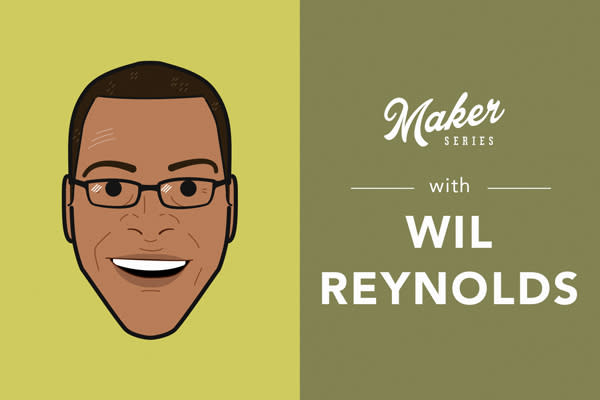When you think of Search Engine Optimization (SEO), chances are specific data-driven language comes to mind: algorithms, rankings, keywords, indexing, all of which you string together to ask How can I get my business in the top of a user’s search? So when Wil Reynolds, Founder and Director of Digital Strategy for Seer Interactive, came to speak at the fourth Maker Series event this year, it was a bit jarring to hear him announce that his workshop wasn’t about increasing rankings. What? A Search User Experience workshop and no talk of algorithms? Wil promised us something better: common sense.
Focus on User Needs
Awareness is paramount when it comes to Google search. To exercise this, open your browser and begin typing how do I get in the search bar. Before finishing that sentence, notice the recommendations for completing your thought. These suggestions show how others are solving problems—what others want, not Google. Wil harped on this point: it’s more important to pay attention to what users are looking for instead of search engines; and when you give users what they’re looking for, you’ll naturally give Google what it wants. So throw out the fallacy that there’s a way to “game the system,” one misconception that has contributed to the SEO industry’s disagreeable past. Your content has to earn the right to rank high.
Abandon Search in a Silo
Thinking more broadly about search is another necessity when understanding how people access information. Wil pointed to a few scenarios where thinking of search in a silo can be problematic, beginning with social media neglection. Of course, there are tips and practices to use social media to boost your SEO rankings, but let’s continue with our common sense approach in better understanding searchers’ needs. Let’s use Wil’s scenario: you’re looking for tires and begin your search in Google. You click on a site, read the content, but there’s missing information you need to make your purchase decision. There’s a link on the site to the company’s Twitter page, so you reach out on Twitter to ask your question and get no response. What happens next? You find another company to buy your tires because that company’s social media has failed you. A good SEO strategy will fall on its face without a good business strategy.
What is an SEO Win?
In the example above, let’s say the tire company had an excellent search ranking. However, even with an envious Google position, they lost an opportunity to sell their product because they thought of search in a silo. So, would this be considered an SEO win? It very well might. Will that lost sale show up in the company’s rankings reports? Probably not.
So what is an SEO win? Is it purely a ranking or is it a conversion? If you’re hyper focused on rankings, you stand a good chance of mistakenly feeling that you’re adding value to your users and business. To achieve company needs, you must achieve users’ needs first. If you provide the content users want, answer the questions they have, and don’t neglect your content outlets, you will most likely have a successful conversion. As Wil mentioned, you may think you’re doing well if you’re at the top in search results and have a top ad. But the moment of truth is when your buyer is ready to purchase and you let them down because you fail to respond to their needs, whether that be missing website information, a poor user experience, or an unanswered question on social media.
Getting the Most out of Wil’s Maker Series
While Wil covered other statistics, the future of search, and a handful of the 20+ factors taken into consideration when you search, the real takeaway was understanding how to use search and how others use it. Having empathy for the user is tool number one in SEO, just like in every other area of the web world: designing websites, creating the most positive UX, and generating a quality content strategy.
The Maker Series promises intimate interaction and opportunities to create relationships with the thinkers shaping our industry, and Wil delivered. In addition to the golden nuggets of information and informative instruction, Wil spent the second half of the workshop essentially consulting with attendees on their businesses. Not only was this extremely valuable for those who were receiving consultation, but the audience was able to observe how he worked and solved problems for completely different companies, demonstrating that sound SEO practices, while very nuanced to specific companies and their needs, cut across all industries.

